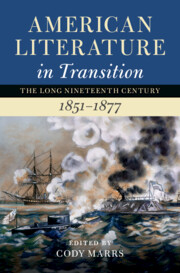Book contents
- American Literature in Transition, 1851–1877
- Nineteenth-Century American Literature in Transition
- American Literature in Transition, 1851–1877
- Copyright page
- Contents
- Figures
- Contributors
- Series Preface
- Introduction
- Part I Careers
- Part II Networks
- Chapter 8 Newspapers and Periodicals
- Chapter 9 Transamerican Literature
- Chapter 10 Oceanic Literature
- Chapter 11 Romanticism
- Chapter 12 Realism
- Part III Exchanges
- Part IV The Long Civil War
- Index
Chapter 12 - Realism
from Part II - Networks
Published online by Cambridge University Press: 15 June 2022
- American Literature in Transition, 1851–1877
- Nineteenth-Century American Literature in Transition
- American Literature in Transition, 1851–1877
- Copyright page
- Contents
- Figures
- Contributors
- Series Preface
- Introduction
- Part I Careers
- Part II Networks
- Chapter 8 Newspapers and Periodicals
- Chapter 9 Transamerican Literature
- Chapter 10 Oceanic Literature
- Chapter 11 Romanticism
- Chapter 12 Realism
- Part III Exchanges
- Part IV The Long Civil War
- Index
Summary
After tallying up what it cost to build his humble “abode in the woods” in Walden (1854), Henry David Thoreau reflects on the far more substantial sums required to establish an institution of higher learning. The typical “mode of founding a college,” he writes, is to get up a subscription of dollars and cents, and then, following blindly the principles of a division of labor, – a principle which should never be followed but with circumspection, – to call in a contractor who makes this an object of speculation, and he employs Irishmen or other operatives actually to lay the foundations, while the students that are to be are said to be fitting themselves for it; and for these oversights successive generations have to pay.1 Although Thoreau himself had trouble paying tuition at Harvard, his primary concern here is not with the bill that students and their families are left to foot when colleges are founded as “object[s] of speculation.” Instead, Thoreau takes issue with the assumption that colleges should be construction sites like any other, a practice he feels is symptomatic of the American college’s misguided sense of mission. By shielding students from the vagaries of life, Thoreau charges, colleges substitute the platitudes of the classical curriculum for anything remotely concrete. There is no shortage of material “professed and practiced,” to be sure, but nothing that could be called useful. Thoreau’s critique was not unique in the mid-nineteenth century. Countless reformers argued against the classical curriculum’s focus on “dead languages” and potted metaphysics, while others railed at the toilsome pedagogy of recitation and “mental discipline” that treated Greek, mechanics, and English as interchangeable tools for training moral character. But if Thoreau is in good company in disdaining the antebellum college, the solution he proposes is far from conventional: students should be required to lay the foundation for their studies in actual concrete – by building the colleges they attend. The point, Thoreau argues, is not to replace the liberal arts with vocational education, but to ground college learning in lived experience. Doing so would help ensure that students do “not play life or study it merely” but “earnestly live it from beginning to end.” No longer shut off from reality, the American college would become a place of active engagement with the world beyond the campus and with “the art of life.”2
Keywords
- Type
- Chapter
- Information
- American Literature in Transition, 1851–1877 , pp. 188 - 204Publisher: Cambridge University PressPrint publication year: 2022

